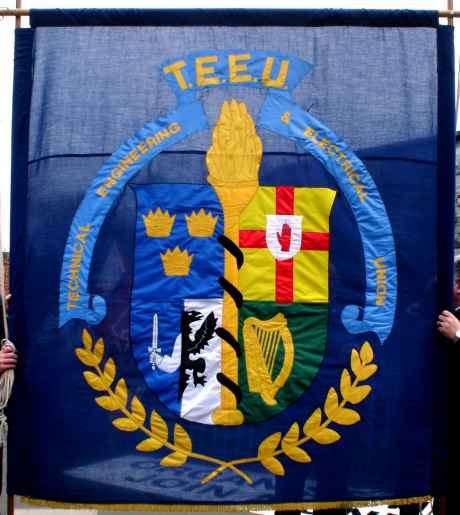Supporting the Electricians Strike
 national |
worker & community struggles and protests |
opinion/analysis
national |
worker & community struggles and protests |
opinion/analysis  Wednesday July 08, 2009 17:34
Wednesday July 08, 2009 17:34 by A
by A
Electricians go on strike in response to a two year employer strike on pay. Since 2007 (roaring property boom) employers have been witholding pay that is legally due to electricians. They are now looking for a 10 per cent pay cut. Employers and unions came to an agreement, the employers broke the agreement, they now refuse to negotiate and are looking for a collective 10 per cent pay cut.
Electricians are entering into a third day of industrial action. It looks likely the Irish Congress of Trade Union (ICTU) will give their backing to the Technical Engineering and Electrical Union call (TEEU) for an all out picket. Pickets have been in place at construction sites on Infirmary road, Lansdowne road, Corrib gas field, Dublin Docklands and Dublin Airport.
Pay rates are set by joint industrial councils and binded through a 'Registered Employment Agreement' (REA). The last REA for electricians was in 2007, where employers agreed to a 4.9 per cent pay increase. After this agreement one of the large sub contractors Association of Electrical Contractors in Ireland (AECI) and Electrical Contractors Association (ECA), who initially signed up, pulled out of the agreement. They broke the contract. They then tried to hold up the process and cancel in the Labour Court. The economic recession hit, and the Construction Industry Federation (CIF), who represent over 50 employer groups, began to support the call for a 10 per cent pay cut.
Like any calculated negotiator, the TEEU responded by calling for a pay rise of 5 per cent. The debate has now been framed 'Unions want 11 per cent pay increase', whilst the poor employers, who can’t afford to pay, need a 10 per cent pay cut'. The reality is the opportunist employers are tearing up legal agreements, a precedent that would have huge effects upon every worker in the country.
Part of the thinking, arguably, behind the employer’s strategy is to move away from the joint industrial system, and to move toward a decentralised pay bargaining system. A free market model. In the good times employers want centralised wage restraint because they know at a local level they will have to pay more. In bad times they want a local bargaining system because they can pay less. By tearing up procedural processes that ensure workers rights are respected they can maintain a 'race to the bottom'.
The contractors that the TEEU are targeting are based in companies (Diageo, Cadbury's and INTEL) not directly party to the CIF. This is why the TEEU is attempting to picket these companies. Some have responded by putting workers on protective notice (making their job security uncertain and less likely to support a strike, and more likely to pass a picket).
Employers (and much of the media) have been arguing that pay cuts are occurring right across the private sector. There has been no detailed evidence to support this. The only research done (Industrial relations news) found the opposite. They found that many profitable private sector companies are actually paying the agreed increases under the social partnership agreement: towards 2016.
Tom Parlon has described Trade Union leaders as 'lunatics'. Their lunacy is demanding that employers respect a legally agreed contract, and that they return to negotiations to find a resolution. Meanwhile FF senators have described the rational response by the Unions as potentially causing more damage to the economy than the banking crisis. This is the banking crisis that was caused by reckless lending to scrupulous property developers, and facilitated by Fianna Fail through tax cuts, fuelling a property bubble that resulted in our current recession.
This is a struggle for social and economic justice, and necessitates the solidarity of all workers and citizens across Ireland.
